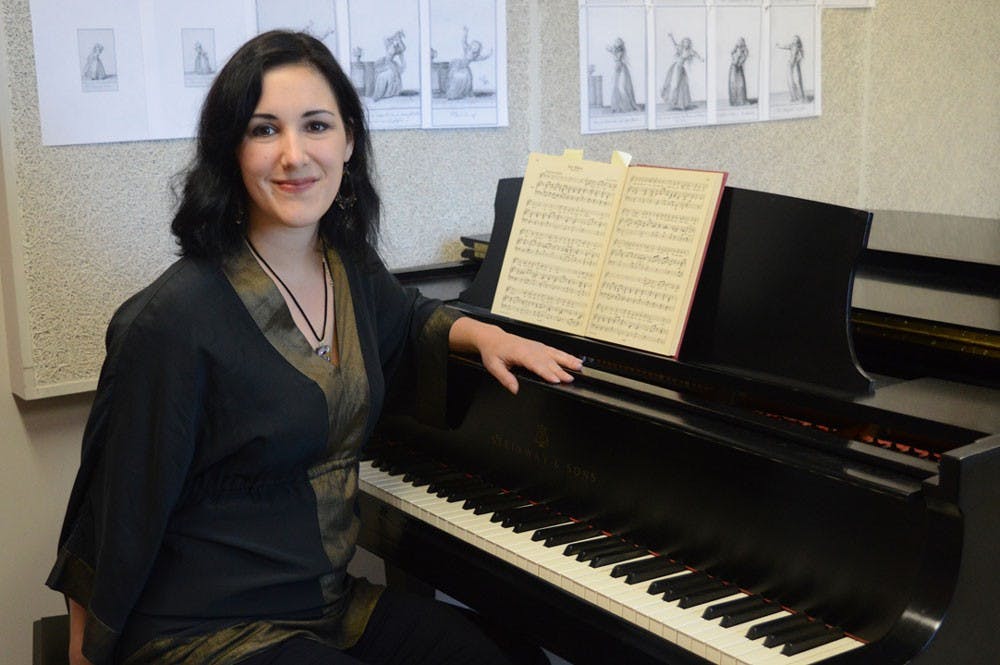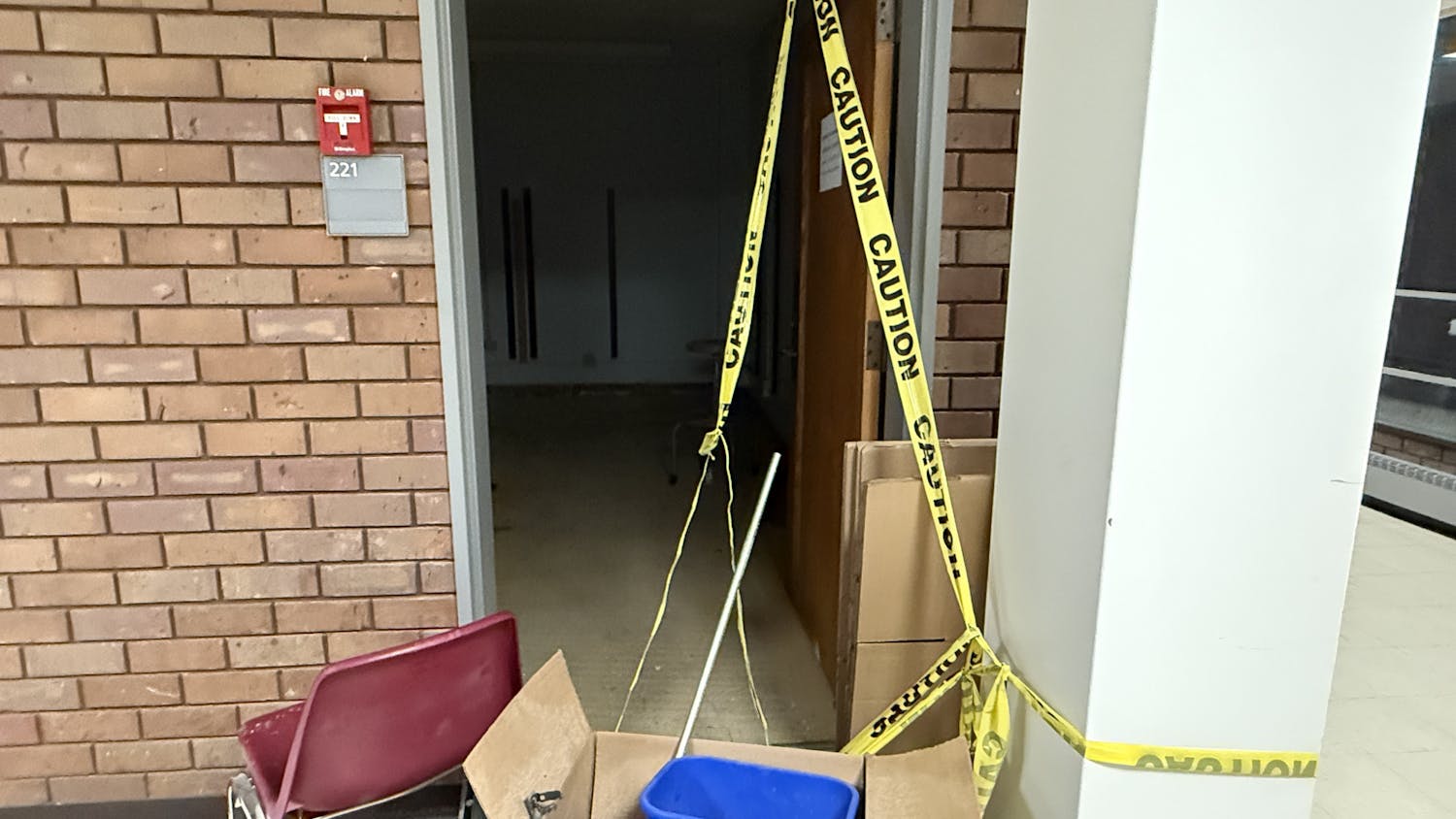When Tiffany DuMouchelle was a vocal teacher in California, one of her Iranian students composed a piece for her to sing. DuMouchelle wanted her performance to fully capture the meaning behind the words.
As DuMouchelle sang, she covered her face with a veil and a man with a flute played over the sound of her voice.
The performance embodied the lack of female presence in music. Her student told her than in Iran, women are not allowed to sing in public or in the company of men.
This was one of the many moments that made DuMouchelle appreciate performing as a woman.
DuMouchelle is an adjunct assistant professor in the music department and the head of the voice program. She is a soprano and received her bachelor’s and master’s from Mannes School of Music in New York City and her doctorate at University at California, San Diego. She specializes in new works but also enjoys multicultural collaboration.
DuMouchelle knew she wanted to take the center stage since she was a child. She has been performing in plays since she was in first grade. Growing up she wanted to be a performer, whether singing or acting. She received immense support from her family to follow an artistic path since her mother is a painter.
She’s traveled the world and has utilized different types of music. She has a background in opera and said she likes how she can use her voice in different ways. She has also sung in 35 different languages including Arabic, Japanese, Russian, and Swedish.
DuMouchelle has had solos at the Lincoln Center and at Disney Hall. She has performed at numerous music festivals and was a recipient of the prestigious Richard F. Gold Career Grant for American Opera Singers.
But there was a time when she thought she would have to put her career on pause.
When DuMouchelle was completing her master’s, she learned that her mother needed a kidney transplant and she was faced with a tough decision. She could donate her kidney to save her mother’s life, but there was a possibility she could somehow lose her voice.
“It definitely distracted me from my career and my ambitions,” she said. “I was burnt out.”
But DuMouchelle knew she was a perfect match and went through with the transplant. Once her surgery was over, she envisioned her life going in a different direction.
“I realized I wanted to do something where I could interact and not be on the road alone,” she said. “When you’re singing opera, people want you to sing, act and look a certain way. I didn’t want my identity to be written about me.”
DuMouchelle assures she still loves opera – she just loves other types of music as well and started working with composers.
“Music isn’t about singing a pretty song,” she said.
One of DuMouchelle’s biggest accomplishments is being a part of Cultures in Harmony (CiH), a non-for-profit organization that encourages people from different cultures to interact through music.
Through CiH, DuMouchelle has traveled to Egypt, Tunisia, Cameroon, and Papua New Guinea. Each trip was a different project where members of CiH worked with musicians in those countries and raised money for local organizations.
When she was in Cameroon, she performed at orphanages, visited prisons and held “jam sessions” with the natives.
“It’s amazing because we don’t all speak the same language but once you start playing music it doesn’t matter who you are, it’s a very special thing,” DuMouchelle said.
During many of her visits to other countries, she witnessed a lack of female representation in music. In some places, women weren’t given the same rights to speech as men, similar to what her student told her about Iran.
DuMouchelle also recalls performing at a music festival in a rural town in Tunisia. CiH was performing with some of the local students when a conservative group came and shut it down because the women were too “open and provocative.”
“We were worried about the welfare of the students,” she said. “What you see as a visitor is completely different from what people see who live there.”
When DuMouchelle visited Alexandria, Egypt, she worked with children between the ages of 7 and 12, many of whom were girls. Most of them lived in underprivilegedneighborhoods.
One of the projects was to write compositions with the children but DuMouchelle said it was difficult to get them to come up with ideas.
“They had never been given this opportunity before,” DuMouchelle said. “Some wrote the lyrics, ‘I love my family.’ Another wrote about not wanting to get hit anymore and another about the children in Palestine. It was an emotional experience.”
But there were still times when DuMouchelle and the children could fully immerse themselves in the music.
DuMouchelle tried improvisational yodeling with a musical group in Nigeria that played talking drums and danced with a traditional Cameroon dance troop.
“The world is a harsh place, so people look to music for reason and escape,” she said.
DuMouchelle said music makes her feel safe and it’s where she’s “always wanted to be.” Now she is in Buffalo, where she loves the snow and teaching.
Rachel Kim was one of DuMouchelle’s vocal students in San Diego from 2009-2012. She said she still uses the warm-ups DuMouchelle taught her when she practices. She said she was very fortunate to have been able to start her start her vocal journey with her.
“As a teacher, she had a great talent for explaining vocal techniques so that I could visualize them,” Kim said. “She was also always trying to help me experience other aspects of music other than just taking lessons and singing. She would practice constantly and always encouraged me to do the same.”
DuMouchelle now teaches a vocal diction class at UB where students work through Italian pronunciation.
Although the music department is only a small part of a huge research university, DuMouchelle sees UB as a “wonderful opportunity” for collaboration.
“A lot of the technological advancements we have now were created by musicians,” she said. “So there is a definite correlation between the arts and sciences. Humanity created arts for a reason.”
DuMouchelle said one thing that has changed her life is working with small groups of people. She said close-knit groups are how people get to know one another and it’s what makes the world “smaller, friendlier and more authentic.”
It has also affected the way she teaches.
“I try to look at my students as individuals,” DuMouhelle said. “Some of my students will be wonderful performers, some will be wonderful teachers and some will not be professional musicians. But I think what they find through music is still applicable to them as individuals.”
Gabriela Julia is the senior news editor and can be reached at gabriela.julia@ubspectrum.com. Follow her on Twitter at @gabrielaajulia.





